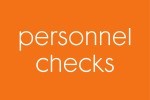You may already be aware of the quick and efficient process we run here at Personnel Checks and if you’ve carried out DBS Checks before on for yourself or your employees, you may also know that the longest stage in the process can often be when the check is at the Disclosure & Barring Service, but why does it take so long? And what happens there?
By Personnel Checks.The DBS processes around 4 million checks a year and each one of those needs to go through a thorough process before the applicant receives their certificate. This is the reason why it sometimes takes longer than expected. These stages make a DBS check accurate and secure which therefore makes your recruitment process a lot safer…
Step one: The DBS receive the application and validate.Your application form is checked for errors or omissions. Within 24 hours of receipt the form is either scanned onto the DBS computer system or returned for correction to your countersignatory. (Personnel Checks)
Step two: The DBS searches the Police National ComputerA search is carried out on the whole national computer database to check your criminal record for any Cautions, Warnings, Reprimands or Convictions you may have.
Step three: Children & Adults barred lists search- (if applicable)Your DBS Application will only undergo this process if you are applying for an enhanced criminal record check and your role involves working with children or vulnerable adults. This step checks whether you’re on the barred lists from working with children or vulnerable adults.
Step four: Records held by local police checked.The length of time it takes to complete this step depends on your previous address history, as your application is sent off in secure and electronic means to local police forces to check their records. So the more precious addresses you have held, the longer this could take.
Step five: The applicants’ DBS certificate is printed and posted.All the disclosed information will then be printed onto a certificate and posted to your home address
Types of check available:Organisations can ask successful job applicants to apply for one of the following types of check depending on the job role:
Standard check - details of an individual’s convictions, cautions, reprimands or warnings recorded on police central records and includes both ‘spent’ and ‘unspent’ convictions.Enhanced check - the same details as a standard check, together with any information held locally by police forces that may be considered relevant to the post applied for.
Enhanced with a barred list check-This is the same as the normal Enhanced check but also includes:
Searches the childrens barred list information is only available for those individuals engaged in regulated activity with children and a small number of posts as listed in the Police Act regulations, for example prospective adoptive parentsSearches the adult barred list is only available for those individuals engaged in regulated activity with adults and a small number of posts as listed in the Police Act regulations
child and adult barred list is only available for those individuals engaged in regulated activity with both vulnerable groups including children and a small number of posts as listed in the Police Act regulationsAdult first Check - an individual can be checked against the DBS adult barred list while waiting for the full criminal record check to be completed. This service is only available for the Care Industry working with adults. For more information either on the DBS process or which levels of check are available for you visit our website here or call one of our advisors on 01254 355688
Enjoyed this? Read more from Personnel Checks





















